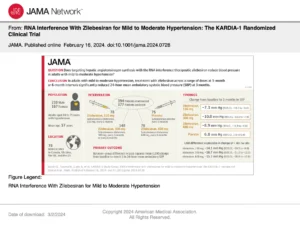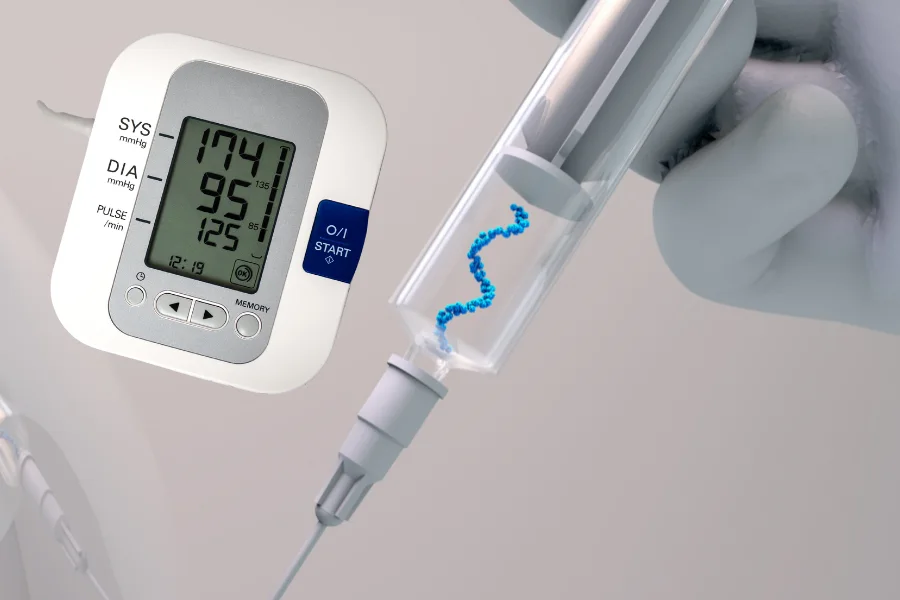High blood pressure presents a formidable global health challenge, often lurking without noticeable symptoms for years. Left unchecked, it can trigger enduring cardiovascular and renal alterations. Managing this silent menace poses difficulties, as medications may provoke adverse effects, leaving patients feeling worse despite the potential benefits of treatment. Hence, the recent JAMA study (RNA Interference With Zilebesiran for Mild to Moderate Hypertension – The KARDIA-1 Randomized Clinical Trial by George Bakris MD et al) delving into the efficacy of six-monthly RNA injections as a treatment avenue is both timely and compelling. Let’s delve into the background of hypertension and then examine what this present study adds to the field.
Understanding Hypertension
Hypertension, commonly known as high blood pressure, is a chronic medical condition characterized by elevated blood pressure levels persistently above the normal range. It poses a significant risk factor for various cardiovascular diseases, including heart attacks and strokes.
Diagnosis of Hypertension
Diagnosis typically involves multiple blood pressure readings taken on different occasions, with hypertension classified into stages based on severity. Goal posts frequently change regarding what values represent high blood pressure. The World Health Organization (WHO) suggests a blood pressure goal is less than 130/80 if you have:
- Cardiovascular disease (heart disease or stroke)
- Diabetes (high blood sugar)
- Chronic kidney disease
- High risk for cardiovascular disease
For most people, the goal is to have a blood pressure of less than 140/90.
Lifestyle Treatment Strategies
Lifestyle modifications play a crucial role in managing hypertension. These include:
Healthy Diet: Adopting a balanced diet, with many of the principles of the Mediteranean diet offers ample variety, fiber, antioxidants, and healthy fats.
Reducing Sodium Intake: Limiting the consumption of sodium-rich foods to help lower blood pressure, particularly in processed foods where salt and sugar may be hidden ingredients in otherwise ‘healthy’ labeled foods
Regular Physical Activity: Engaging in regular exercise to improve cardiovascular health.
Limiting Alcohol Consumption: Moderating alcohol intake to maintain healthy blood pressure levels.
Maintaining Healthy Weight: Achieving and maintaining a healthy weight through proper diet and exercise.
Stress Reduction Techniques: Incorporating stress-relieving activities such as meditation or yoga into daily routines.
Smoking Cessation: Quitting smoking to reduce the risk of cardiovascular complications associated with hypertension.
Managing obstructive sleep apnea – this is an often-forgotten contributing factor to high blood pressure and one that should be considered.
Natural Supplements and Management Strategies
Some natural supplements have shown potential in managing blood pressure. These may have a small impact on blood pressure and may be suitable with appropriate physician supervision for mild cases before considering medication.
These include:
Garlic: Known for its potential to lower blood pressure.
Omega-3 Fatty Acids: Found in fatty fish like salmon and mackerel, may help reduce blood pressure.
Coenzyme Q10: A compound that may benefit blood pressure levels.
Magnesium: Magnesium supplementation has been associated with modest reductions in blood pressure and may benefit individuals with magnesium deficiency.
Nitric Oxide Products: Nitric oxide plays a crucial role in dilating blood vessels and improving blood flow. Some supplements or foods that promote nitric oxide production, such as beetroot juice or nitrate-rich foods, may help lower blood pressure.
It’s important to note that while these supplements show promise, their efficacy may vary, and consultation with a healthcare professional is advisable before incorporating them into treatment plans.
Classes of Antihypertensives
When blood pressure continues to rise despite lifestyle changes, it is important to work on achieving lower blood pressure with medication. The aim is always to limit the number and dosage of medicines.
Commonly used classes of antihypertensive medications include:
Diuretics: Thiazide diuretics help the body eliminate excess sodium and water, thereby reducing blood volume and pressure.
ACE Inhibitors: These medications inhibit the action of the angiotensin-converting enzyme, leading to vasodilation and reduced blood pressure.
ARBs (Angiotensin II Receptor Blockers): Similar to ACE inhibitors, ARBs block the action of angiotensin II, resulting in vasodilation and lowered blood pressure.
Calcium Channel Blockers: These medications prevent calcium from entering the heart and blood vessel cells, leading to the relaxation of blood vessels and reduced blood pressure.
Beta-Blockers: They block the effects of adrenaline on the heart and blood vessels, reducing heart rate and blood pressure.
Alpha-Blockers: These medications block the action of certain nerve impulses, leading to the relaxation of blood vessels and reduced blood pressure.
Central Agonists: These drugs work by reducing the activity of the sympathetic nervous system, resulting in decreased heart rate and blood pressure.
Management of hypertension often involves a combination of lifestyle changes and medication from one or more of these classes, tailored to the individual patient’s needs and health profile.
What is Zilebesiran?
Zilebesiran is an RNA-based therapeutic agent designed to target specific genetic pathways involved in regulating blood pressure. Specifically, it utilizes RNA interference (RNAi) technology to downregulate the expression of genes associated with hypertension. It impacts pathways involved in the renin-angiotensin pathways, specifically on angiotensinogen.
By reducing the levels of specific proteins involved in hypertension regulation, Zilebesiran helps to modulate blood pressure levels and mitigate the effects of high blood pressure on cardiovascular health. Overall, Zilebesiran represents a novel approach to hypertension treatment by leveraging RNA technology to target specific genetic pathways, offering the potential for more precise and tailored therapeutic interventions for individuals with high blood pressure.
Recent Study
The JAMA study recently evaluated Zilebesiran, which is given to patients with high blood pressure every three or six months with a single injection delivered beneath the skin (subcutaneous). The KARDIA-1 was a phase 2 randomized study conducted at 78 sites in Canada, Ukraine, the UK, and the US between July 2021 and June 2023. Key take-home messages of the trial are:
- Zilebesiran, an investigational RNA interference therapeutic, significantly reduced 24-hour mean ambulatory systolic blood pressure (SBP) in adults with mild to moderate hypertension.
- The study included 394 randomized patients, with 377 patients included in the full analysis set.
- Zilebesiran doses of 150 mg, 300 mg, or 600 mg every six months, or 300 mg every three months significantly decreased SBP at 3 and 6 months compared to placebo.
- Adverse events were reported in 60.9% of patients receiving zilebesiran, with injection site reactions and mild hyperkalemia being the most common nonserious drug-related adverse events.
- Treatment with zilebesiran was associated with significant reductions in 24-hour mean ambulatory systolic blood pressure (SBP) at month three compared with placebo, with reductions of up to 16.7 mm Hg.
- The reductions in SBP were maintained over the full diurnal cycle, with consistently lower daytime BP, nighttime BP, and office BP in zilebesiran-treated patients.
- The study suggests that biannual dosing of zilebesiran may provide durable blood pressure reductions and could be a potential therapeutic strategy for patients with hypertension.
The study highlighted the novel approach of targeting hepatic angiotensinogen synthesis for blood pressure regulation. Overall, the trial adds to the current literature by providing evidence for the efficacy and safety of zilebesiran as a therapeutic strategy for patients with hypertension.

Conclusion
In conclusion, the use of Zilebesiran as an RNA-based therapeutic agent administered every three or six months presents a promising alternative strategy to daily or multiple-times-a-day medication for managing hypertension. This approach addresses concerns related to variable compliance and potential side effects associated with traditional medications. While the potential benefits of this treatment avenue are exciting, further studies are warranted to confirm its long-term efficacy and tolerability as an injectable medication. Nonetheless, Zilebesiran represents a significant advancement in hypertension management and opens the door to a new era of personalized and convenient therapeutic options for patients with high blood pressure. Watch this space!!


